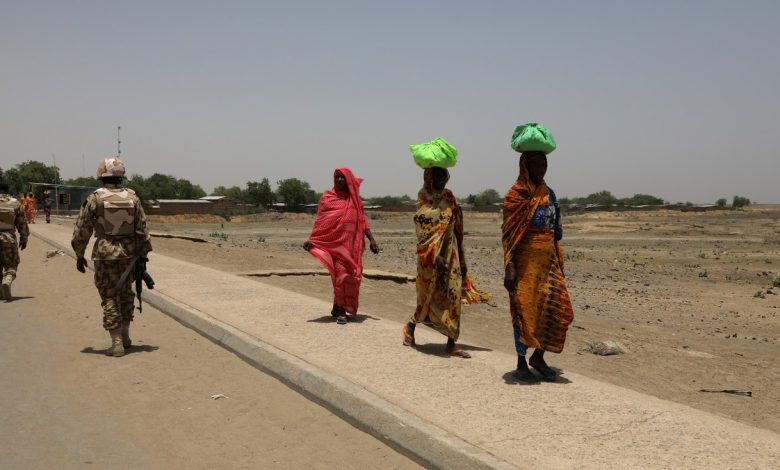As IDPs Face Pressure To Return Home, Are Their Communities Safer?
In the first 10 days of June, 2020, more civilians have been reported killed than in any single month since 2019.

Despite repeated victory announcements from the Nigerian government on the fight against insurgency, more Nigerians have been reported killed by terrorists in the first 10 days of June, 2020, compared to other months.
This has left communities desolate with several residents fleeing. However, some state governments are going ahead with plans to disperse persons in Internally Displaced Persons (IDPs) camps across the country.
The frequency and magnitude of recent attacks by insurgent groups suggest these camps are still needed.
In 2015, the government announced that it was going to close some of the camps in Adamawa by December of that year and the following month close some in Borno State.
Surveys conducted at the time by the International Organisation for Migration, showed that while the majority of IDPs desired to return home, 80 per cent did not think it was safe for them to do so.
Not much has changed since then
Three years later, the government again asked thousands of displaced people to return to their home communities because of mounting pressure “to show progress in the war against Islamist groups ahead of a presidential election.”
In June, 2018, about 2,000 IDPs at the Bakassi camp in Maiduguri were ordered to go back to their homes in Guzamala, which was still targeted by insurgents.
The authorities threatened to cut supplies to the camp regardless of the IDPs reservations.
The army later said the return was made possible “following the achievements recorded by the troops of Operation Lafiya Dole”.
Displaced people have continued to be evacuated from camps and taken to their hometowns. The Yobe State government announced in February, 2020, that over 5,600 IDPs had returned to their communities in Geidam, Gujba, Gulani and Yunusari.
In June, 2019, some 25,000 IDPs in Zamfara State returned to their homes,
according to the State Emergency Management Agency.
The returnees were given assurance that the deployment of more security personnel has “led to the return of peace in many parts”. Again with the promise of adequate security, more displaced persons in the state were directed to go back on Tuesday.
Recent trends are a sign that some of these moves might have stemmed from miscalculations of the security situation in some communities.
The Benue State government in March, 2020, was forced to suspend plans to return IDPs to their homes in face of “resumed attacks and killing by the Fulani herdsmen”.
“It will be inhuman to conceive the idea of closing the camps and ask the IDPs to return to their homes,” the governor, Mr Samuel Ortom, explained.
More attacks, more displacement
According to data from the Nigeria Security Tracker, since January, 2020, 6,624 lives have been lost to insecurity across the country, especially owing to the insurgency in the Northern region.
This figure includes over 2,200 unarmed civilians and 459 security officials. In the first 10 days of June, more civilians have been reported killed than in any single month since 2019.
Borno State governor, Prof Babagana Zulum, confirmed on Wednesday, June 10, 2020, that up to 81 people were killed and others injured during a recent terrorist attack on Faduma Kolomdi, a nomadic village north of Maiduguri.
“The Boko Haram terrorists in gun trucks and armoured tanks came around 10 a.m. on Tuesday. They operated for about six hours and left around 4 p.m.,” one witness said.
“They gathered us and said they wanted to deliver a religious sermon to us. They asked us to submit whatever arms we had. Some villagers gave up their dane guns, bows and arrows,” the witnesses explained.
He said the insurgents suddenly started shooting and later went away with seven persons, including the village head, as well as hundreds of cows.
“We have buried 49 corpses here, while another 32 corpses were taken away by families from the villages around us,” he said.
Also on Tuesday, over 40 people were killed during an attack on Kadisau, a community in Faskari Local Government Area, Katsina State. A source told HumAngle that the bandits rode on over 100 motorcycles and started by setting houses and shops ablaze while shouting, “Yuu have no place to hide today.”
The destruction of houses is a common trend that aggravates the displacement of victims of terrorist attacks.
During attacks on Tungua and Utsua-Daa communities in Taraba State on Thursday, June 4, houses were burnt and residents forced to flee, witnesses said.
An attack on travellers by Boko Haram members on Wednesday, which left four persons dead and eight others injured, supports the view that Nigeria may be too eager to assume certain communities in the Northeast are generally secure.
The Maiduguri-Damboa Road where the ambush took place was reopened by the army in January after years of closure with the assurance that there was no risk to the lives of motorists and commuters.
Since Boko Haram launched its campaign of terror in July, 2009, the conflict has caused about 2.5 million people to become displaced and led to the emergence of 244,000 Nigerian refugees, according to the United Nations High Commissioner for Refugees and Council on Foreign Relations. Also, over 7.1 million people in the Northeast currently rely on humanitarian support for survival.
Support Our Journalism
There are millions of ordinary people affected by conflict in Africa whose stories are missing in the mainstream media. HumAngle is determined to tell those challenging and under-reported stories, hoping that the people impacted by these conflicts will find the safety and security they deserve.
To ensure that we continue to provide public service coverage, we have a small favour to ask you. We want you to be part of our journalistic endeavour by contributing a token to us.
Your donation will further promote a robust, free, and independent media.
Donate HereStay Closer To The Stories That Matter




